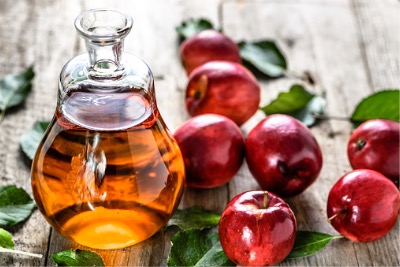
Is Cooking with Alcohol Halal?
What do beer battered fish, Bolognese sauce and tiramisu have in common? The answer is their recipes contain alcohol. Most people know that alcohol is not Halal for Muslims to consume. But what about cooking with alcohol and ingredients that include alcohol?
Recipes Containing Alcohol
During the pandemic, cookbook sales skyrocketed, and millions of people turned to food networks and online videos to learn how to cook or to expand their cooking abilities. This resulted in higher sales of cooking supplies, equipment, ingredients, ethnic foods, and even alcohol for cooking.

More and more cooks who followed Halal dietary requirements were asking “What do I do when a recipe calls for alcohol?”
There are many answers to that question. One option would be to avoid the recipe entirely. Another is to simply ignore the alcohol component of the recipe. Thankfully, there are better options out there. There are very good substitutes for alcohol in cooking. Here are some examples:
- For brandy substitute apple juice
- For beer substitute chicken broth, tomato juice or apple juice
- For champagne substitute sparkling apple juice
- For Kahlua and coffee liqueurs substitute strong coffee
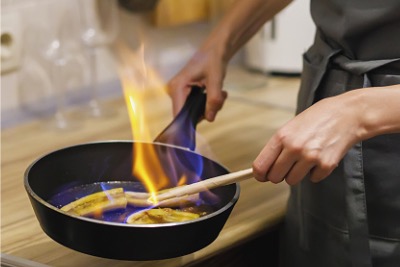
- For red wine substitute chicken broth or beef broth or grape juice or even tomato juice. Cooks can also combine grape juice with chicken or beef broth.
- For white wine substitute white grape juice mixed with ginger ale or chicken broth.
- For tequila substitute cactus or aloe juice.
- For rum substitute molasses with pineapple juice and almond extract.
Vinegars
Many people want to know if vinegars like red wine vinegar, apple cider vinegar, balsamic vinegar or white vinegar are Halal. Vinegars are derived from wine products, but do not contain enough alcohol to intoxicate. Most scholars agree that vinegar is Halal. Vinegars can be found in hundreds of over-the-counter sauces, dressings and spreads in Europe and North America. Vinegars are also healthy and add flavor to many foods. It’s used to make cheese like ricotta. And it’s an excellent cleaning product and antiseptic.
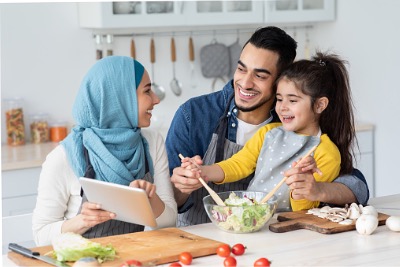
Alcohol Cook Off – Busting the Myth
To flambé, a cook douses a dish in alcohol, lights a match, the flames spread and rise quickly and burn the alcohol off the food. It’s often used when cooking fish, lobster, meat, and desserts.
Unfortunately, the flambé process does not remove all the alcohol and neither does long time cooking. According to a 1992 study by the USDA, after flaming, about 75% of the alcohol remains in the pan. Studies that have been conducted by ISU and other organizations found that alcohol burns off after hours of cooking. See the chart below:
|
Time Cooked at Boiling Point of Alcohol |
Approximate Amount of Alcohol Remaining |
|
15 minutes |
40 percent |
|
30 minutes |
35 percent |
|
One hour |
25 percent |
|
Two hours |
10 percent |
|
Two and one-half hours |
5 percent |
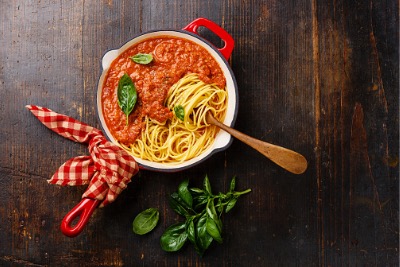
Halal consumers should simply not cook with alcohol. In addition, for multiple reasons, it’s not advised for Muslims to bring alcohol into their homes for cooking. When eating in restaurants, Halal consumers are advised to ask if the food contains alcohol and to avoid it. The server may say “yes but it’s burnt off or cooked off” because they are not aware of the above studies.
Happy cooking, experimenting and substituting! And Bon Appetit!
Islamic Services of America (ISA) plays a large role in the Halal industry both as an educator and a certifier. ISA partners with companies that specialize in the production of all consumable and non-consumable products and certifies those that are found to be Halal compliant. For More information visit www.isahalal.com or contact info@isahalal.com
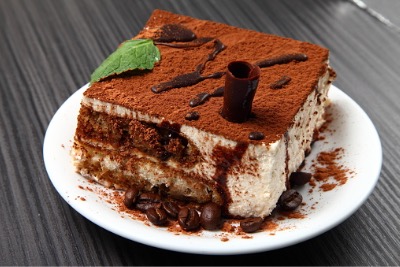
picture credit: istock.com